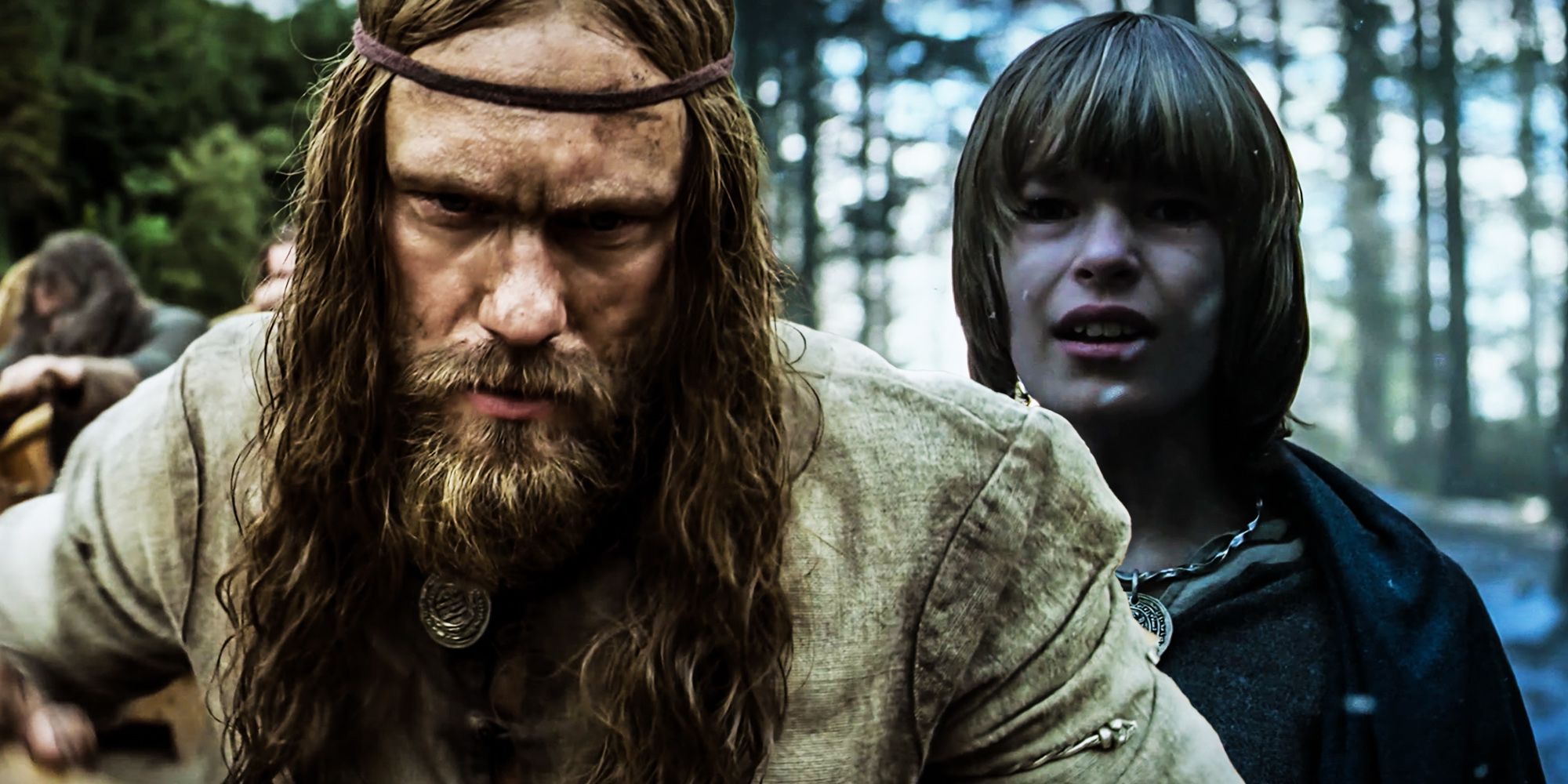The Northman is focused on Amleth, the Viking prince who is out for revenge, but who is he really and how does the legend compare with the film? Directed and co-written by Robert Eggers, The Northman follows Amleth (Alexander Skarsgård), who escaped his uncle Fjölnir’s (Claes Bang) clutches following the murder of his father, King Aurvandill (Ethan Hawke).
The film is a tale of revenge, one that is aided by spiritual entities and foretold ahead of Amleth’s ascent to Valhalla. Amleth is a medieval figure in Scandinavia and his story has been told and passed down over many centuries before being globally popularized in William Shakespeare’s Hamlet at the turn of the 17th century. The Northman includes a good amount of Norse mythology, including references to Odin, Valhalla, and Valkyrie.
Steeped in rich Viking history and lore, Eggers’ film retells the story of Amleth for modern audiences, focusing on his time with the Berserkers, Viking warriors who wore animal pelts and pillaged villages, and his plan to avenge his father’s death by killing his uncle and saving his mother. But who is Amleth really? Was he based on a real person, and was The Northman historically accurate when it came to the film’s setting and Viking life? Here is the Scandinavian legend explained, including key differences from the story from oral tale to the big screen.
Amleth The Viking Prince Explained: Was He Real?
As far as anyone can tell, there is no historical evidence that Amleth was a real person. The legend of Amleth dates back thousands of years. Primarily, the story itself — and references to it — were passed down through word of mouth. However, a more complete version of Amleth’s story was written by Saxo Grammaticus in the early 13th century’s publication of Gesta Danorum, a collection of Danish history up until Grammaticus’ time. Scholars believe that many of the stories in Grammaticus’ work is that of myths and legends told throughout the region.
At the time, tales of vengeance were common. When anyone murdered kin, the response was to kill them in return to restore the family’s honor and reputation. Amleth is a representation of these themes and the lengths he would go for his family, who were beholden to the greed and jealousy of Feng (Fjölnir in The Northman). In most of the retellings, including Grammaticus’ published work, Amleth is witness to his uncle killing his father. He then pretends to be incompetent so as to avoid his uncle’s violence. His revenge is well-plotted and deliberate and has become the basis for all modern adaptations of the story in the western world.
The History Of Amleth’s Scandinavian Legend & Influence On Hamlet
It’s hard to say how Amleth’s story originated. Tales of a son avenging his father’s murder by a jealous family member is not unique to the Vikings. In fact, similar stories date back to ancient Egyptian mythology and are also found in various other legends across cultures and regions. The story of Amleth was later given life beyond Scandinavia, specifically in France and England in the 16th century. French author François de Belleforest made Amleth’s tale even longer than it originally was and English playwright, most likely Thomas Kyd, is thought to have brought a version of the story, now known as Ur-Hamlet (original Hamlet) to England circa the late 1580s. The legend of Amleth is thought to have originated from an Old Norse poem from the 10th century, but there is no evidence the poem has ever existed, though it may have been lost to time.
Also unclear is how William Shakespeare first came to hear of Amleth’s tale. However, the English author pulls much of Hamlet, which moves the “h” from the end of Amleth’s name to the front, from the originally published work of Grammaticus. King Claudius is Feng/Fjölnir, the brother who slays the king and marries his wife, Queen Gertrude, who is Geruth/Gudrún. Similar to the original tale as well is Claudius’ attempt to discover Hamlet’s plot against him. There are core differences as well, especially when it comes to the moral themes present throughout Hamlet. Shakespeare’s character is torn about killing Claudius and has moments where he isn’t sure he killed his father at all. Whereas Amleth has no such qualms about his plot for revenge. However, the core premise essentially remains the same, with Hamlet exacting revenge on his uncle for his crimes against his father. The tale of Hamlet and Amleth both resonate with audiences and continue to make an impact on pop culture.
How Amleth’s Legend Differs From The Northman
In the myth written down by Grammaticus, Amleth is the son of Horwendil and Geruth, who is convinced to marry Feng after he murders Horwendil because he harbored a lot of envy towards his brother. In the legends, Amleth usually feigns being a fool so as not to draw attention from his uncle and so the Viking isn't killed. It’s how he lives out his days for a while, but Feng remains wary of his nephew for a long time until his suspicions that he is actually clever are confirmed. He sends Amleth to England, ordering his execution by the king, but Amleth changes the letter so that the orders are to kill his attendants instead. Of course, these aspects of the story are not present in The Northman, with Eggers deciding to go a somewhat different route with regards to Amleth’s personal journey.
Rather than pretending to be less intelligent than he is, Amleth flees his home altogether, living for years with the Berserkers before he’s drawn back to his plans to kill Fjölnir. The confrontation Amleth has with Queen Gudrún is similar to the myth in that the son reveals his plans for revenge to his mother. However, The Northman sees the titular character doing that after years of being away, unknowing of his mother’s own plot to have Fjölnir murder Aurvandil, which is a major departure from Grammaticus’ text. When Amleth and Fjölnir finally do battle each other, it is at the mouth of a volcano. In the original myth, Amleth arrives at his funeral (because he was thought to be dead) and runs to kill his uncle, who was asleep in his room. The Northman’s changes make the story a lot more dramatic, with Eggers throwing in a lot more Norse mythology because it likely would have gone hand-in-hand with the time period.
Crucially, the original story has Amleth crowned king, whereas The Northman sees that title stripped from Fjölnir altogether. Someone else had laid claim to the throne and Amleth died alongside his uncle, unable to reclaim his role in succession. The film itself is more grounded than the myth, detailing certain aspects of daily life, including slavery and the Berserkers’ presence, that would have been a part of Viking society. Though there are quite a few changes, including the addition of Olga as Amleth’s romantic interest (replacing the king of England’s daughter in Grammaticus’ work), The Northman stays true to the heart of the story, Amleth’s journey and need to restore honor to his family.




